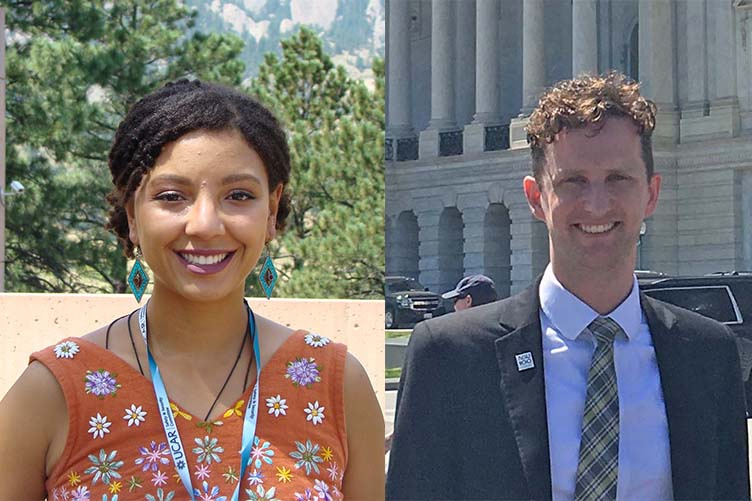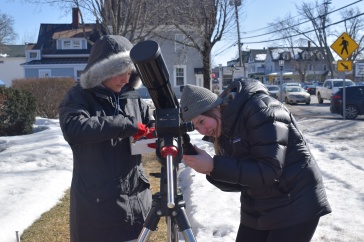
Tamara Marcus and Drew Robison are among 35 national scientists selected as ambassadors for the AGU Voices for Science program.
Two UNH graduate students are giving New Hampshire science a national voice.
Tamara Marcus and Drew Robison are among those selected to be ambassadors for the 2019 Voices for Science program. Supported by the American Geophysical Union, the program was designed to create a national network of scientists who share their research and scientific interests with a variety of audiences. Think of it as a way for scientists to emerge from their echo chambers and connect with non-scientists and people who shape public policy.

This year, 35 scientists from 29 research and higher education institutions were selected to participate in Voices for Science. The one-year commitment requires that the ambassadors engage in some type of science communication activity each month. Marcus and Robison, both of whom are in the UNH Natural Resources and Earth Systems Science Ph.D. Program, are pursuing different tracks of the program: communications and policy, respectively.
“Voices for Science — and the communications track in particular — appealed to me because it’s an opportunity to engage with actual scientists who are doing science communication,” Marcus says. “It’s born out of my desire to connect people with data,” she explains.
Robison chose the policy track because, as he says, “I’ve always cared about politics but haven’t necessarily had an avenue or the knowledge to pursue it. I saw this program as an opportunity to delve into that world a little more concretely.”
By way of kicking off this year’s program, Robison and Marcus spent two days during April in Washington, D.C., to build connections with their policy and communications program cohorts, explain the research they’re conducting through UNH, and start thinking about their science communication plans for the year ahead. Robison had the opportunity to visit with staffers from five Congressional and two Representative offices from New York, Maryland, and N.H. — including Representative Pappas and Senators Shaheen and Hassan — to discuss their support for robust science funding.
“I really enjoyed that experience, thinking about how to communicate science and the importance of science communication to policy makers,” he says. "There’s a ripe opportunity to make connections and showcase the scientific research coming out of UNH.” He’s working on plans to promote dialogue between policy makers and the UNH community in the coming year.
"There's a ripe opportunity to make connections and showcase the scientific research coming out of UNH."
While meeting with the communications track cohort, Marcus made new connections with scientists across the country who, like herself, are working with indigenous communities as part of their research. They are brainstorming some ideas to highlight indigenous scientific knowledge via “atypical science communication methods,” she says.
Both Marcus and Robison note that while organizations have made strides in training scientists to engage with and speak to various audiences, there’s still a lot of room for improvement; diversity and inclusion remains an important topic that has not been properly addressed in science and science communication.

“I think there’s an opportunity to shift this field and discuss diversity and inclusion issues in a way that’s integral to science communication,” Marcus says. “This program has been really helpful to build a network of science communicators who are interested in working on these topics.” She adds that she would like to bring a version of Reclaiming STEM — a science communication workshop series by and for diverse scientists advocating for change — to the UNH community.
Marcus and Robison say they hope faculty, staff, and students will reach out to them to discuss their ideas for potential events or collaborations that will elevate science and science communication in the coming year. To learn more about their work as Voices for Science ambassadors, follow along with them on Twitter: @werdrobison and @TaxpayerScience.
-
Written By:
Rebecca Irelan | Institute for the Study of Earth, Oceans, and Space | rebecca.irelan@unh.edu | 603-862-0990
















































